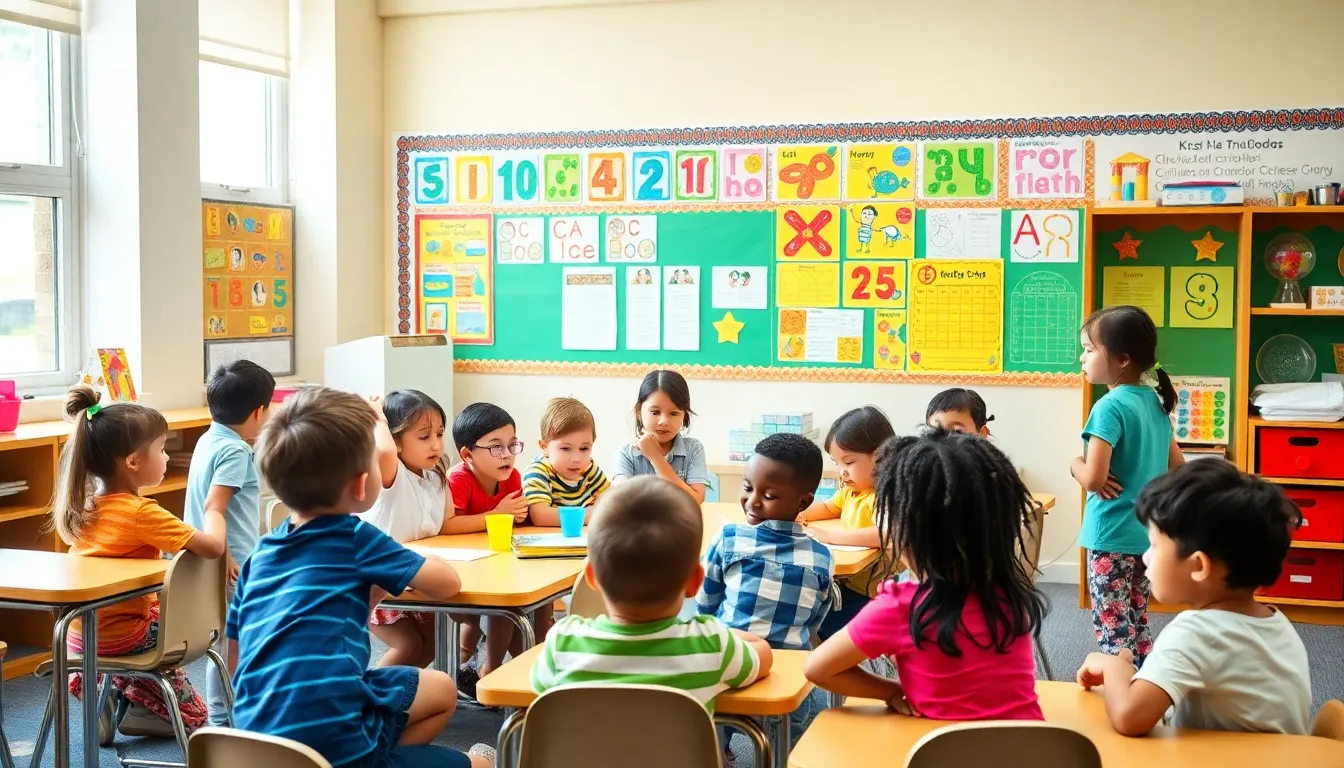Table of Contents
ToggleFinding the right elementary school can be a daunting task for parents. With so many options available, it’s crucial to identify a school that meets a child’s educational needs and aligns with family values. The phrase “elementary school cerca de mi” resonates with many as they seek quality education close to home.
Local elementary schools play a vital role in shaping a child’s early learning experiences. They provide not just foundational knowledge but also foster social skills and community involvement. By exploring nearby schools, parents can discover diverse educational programs and resources that cater to their children’s unique talents and interests.
Overview of Elementary Schools
Elementary schools play a crucial role in a child’s early educational journey. They serve students typically aged 5 to 11, providing a structured environment for foundational learning. These schools focus on core subjects such as reading, writing, and mathematics, emphasizing the development of critical thinking skills.
Local elementary schools also contribute to social development. They offer opportunities for children to interact with peers, fostering communication skills and teamwork. Extracurricular activities, such as sports, arts, and music, complement academic learning, catering to various interests and talents.
Public and private elementary schools exist within communities, each offering distinct programs. Public schools follow state curriculum standards, while private schools may provide specialized curricula tailored to specific educational philosophies. Families often explore both options to find a school that aligns closely with their educational goals and family values.
Prospective parents can assess elementary schools by examining academic performance, teacher qualifications, and student-teacher ratios. Many schools offer open houses or tours, allowing parents to gauge the learning environment and available resources. Additionally, online reviews and local forums can provide insights into community perceptions of specific schools.
Elementary schools are essential for shaping children’s academic and social development, making it important for families to consider nearby options that best suit their needs.
Importance of Elementary Education

Elementary education serves as the foundation for lifelong learning, shaping children’s academic and social capabilities. It plays a vital role in preparing them for future educational challenges.
Developing Fundamental Skills
Elementary schools focus on essential academic skills, including reading, writing, and mathematics. They introduce core concepts through interactive learning, enhancing children’s ability to think critically. Moreover, these institutions emphasize literacy, numeracy, and problem-solving skills essential for later education. Early mastery of these skills ensures students build confidence and develop a love for learning. Targeted curricula address diverse learning styles, helping children progress at their own pace.
Socialization and Peer Interaction
Social interaction is a crucial aspect of elementary education. Schools provide structured environments where children engage with peers, fostering friendships and collaboration. Group activities, classroom discussions, and team projects create opportunities for developing communication and teamwork skills. Participation in extracurricular activities, such as sports and arts, encourages students to explore interests and build a sense of community. Positive social experiences contribute greatly to emotional intelligence, helping children navigate relationships and understand diverse perspectives.
Finding an Elementary School Cerca De Mi
Locating an elementary school nearby requires thorough research and exploration of available resources. Parents can use various online tools and community recommendations to identify schools that align with their children’s needs.
Online Resources and Tools
Search engines provide access to school directories and reviews. Websites such as GreatSchools.org offer valuable insights into local elementary schools, including academic ratings, parent reviews, and detailed information about educational programs. School district websites present data on enrollment, curriculum, and extracurricular activities. Mapping services also enable users to visualize school locations and distances from their homes, helping families find convenient options. Social media platforms often feature local parenting groups where members share recommendations and experiences, adding a personal touch to school selection.
Local Community Recommendations
Engaging with the local community can yield insightful school recommendations. Visiting neighborhood gatherings, community centers, or local events allows parents to connect with other families and gather advice. Local librarians, pediatricians, and childcare providers often have knowledge of local schools and can provide valuable insights. Online forums or community boards may also host discussions about nearby schools, highlighting strengths and concerns. Collaborating with these community contacts facilitates informed decisions and aids in discovering schools that best match family values and children’s needs.
Factors to Consider When Choosing a School
Choosing the right elementary school involves evaluating several key factors. These considerations help parents identify an environment that best supports their child’s education and development.
Curriculum and Academic Programs
Curriculum and academic programs serve as the backbone of an elementary school. Parents should assess whether a school offers a balanced curriculum that includes core subjects like reading, writing, mathematics, and science while also integrating technology and critical thinking skills. Inquiry-based learning models and hands-on activities promote engagement and retention of knowledge. Schools may also provide specialized programs such as Montessori or STEM (Science, Technology, Engineering, Mathematics) education, catering to diverse learning styles and interests. Reviewing standardized test scores and overall academic performance metrics can provide insight into the effectiveness of the curriculum and educational approach.
Extracurricular Activities
Extracurricular activities enhance students’ school experience by fostering creativity, social skills, and physical health. Parents should investigate the variety of activities available, such as sports teams, music programs, art clubs, and academic competitions. Participation in these programs supports children’s social development and provides valuable opportunities for teamwork and leadership. Schools with a robust extracurricular offerings encourage diversity in interests and allow children to explore new skills outside the classroom setting. Additionally, extended learning opportunities through afterschool programs or summer camps can further enrich a child’s educational journey.
Reviews of Local Elementary Schools
Evaluating local elementary schools involves analyzing performance metrics and parent feedback. Schools receive varying ratings based on academic achievements, teacher certifications, and extracurricular options.
School A
- Academic Performance: School A boasts a high proficiency rate in mathematics and reading, with 90% of students meeting state standards.
- Parent Reviews: Parents commend the dedicated staff and inclusive environment, noting strong community involvement.
- Extracurricular Options: Offers arts, sports, and coding clubs, allowing students to explore diverse interests.
School B
- Academic Performance: School B ranks slightly lower, with 78% of students meeting academic benchmarks.
- Parent Reviews: Feedback highlights the supportive administration and opportunities for personalized learning, though some feel more resources for enrichment are necessary.
- Extracurricular Options: Includes team sports and music programs, fostering collaboration and creativity among students.
School C
- Academic Performance: School C exhibits consistent growth, with 85% of students achieving proficiency in core subjects.
- Parent Reviews: Parents appreciate the focus on social-emotional learning, which enhances student well-being and resilience.
- Extracurricular Options: Features a variety of clubs, including robotics and gardening, promoting engagement beyond academics.
Comparisons
- Overall Ratings: Schools A, B, and C show strengths in different areas, requiring parents to prioritize what aligns with their child’s needs.
- Community Engagement: Strong community ties across all schools contribute to a positive learning atmosphere and provide additional resources.
Reviews confirm that local elementary schools play a pivotal role in developing well-rounded students. By considering these evaluations, parents can make informed decisions regarding their child’s educational journey.
Finding the right elementary school nearby is a crucial step in a child’s educational journey. Parents are encouraged to explore options that align with their values and meet their children’s unique needs. Engaging with the local community and utilizing available resources can provide valuable insights into the best choices.
By prioritizing factors like curriculum quality and extracurricular opportunities, families can ensure their children receive a well-rounded education. The right school can foster not only academic growth but also social development, setting the stage for a lifetime of learning and success.




